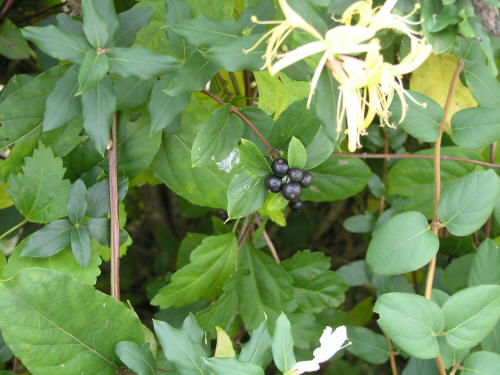Japanese Honeysuckle
Japanese Honeysuckle
Lonicera japonica
Caprifoliaceae (Honeysuckle Family)
▲ ▼ new growth emerging in spring
▲ ▼ sometimes new growth has lobed, oak-like leaves
▲ ▼ semi-evergreen twining vines in autumn
▲ ▼ summer growth and flowering
▲ ▼ flowers

▲ flowers and small, black berries (fruit)
Wild Honeysuckle, Japanese Honeysuckle: (not in Weeds of the Great Plains; pp. 332-333, Weeds of the Northeast)
Lonicera japonica: Japanese Honeysuckle, Wild Honeysuckle
Locations on/near campus: the 'Halliana' cultivar is growing on the southwest corner of Kings and Grand; the wild form is growing in the hedgerows south of the alley that runs behind the houses on Loren St.
- semi-evergreen to evergreen, opposite, ovate to lanceolate leaves with entire margins 1.25-3.25" long
- leaves pubescent on both sides when young, top side becoming glabrous with age
- stem reddish brown to light brown with soft pubescence when young; has excavated or hollow pith
- climbs by twining around other objects and itself
- has creeping roots
- has very fragrant white flowers which turn yellow with age
- used as a groundcover, but has escaped cultivation and can become a serious weed pest
- grows well in full sun to part shade, not particular on soil types
- fast rate of growth
- when grown as a ground cover, grows 18-24" tall; vine can reach 15-30' long
- ‘Halliana,’ Hall’s Honeysuckle is common cultivar used in landscaping, with more purple stems and leaf undersides